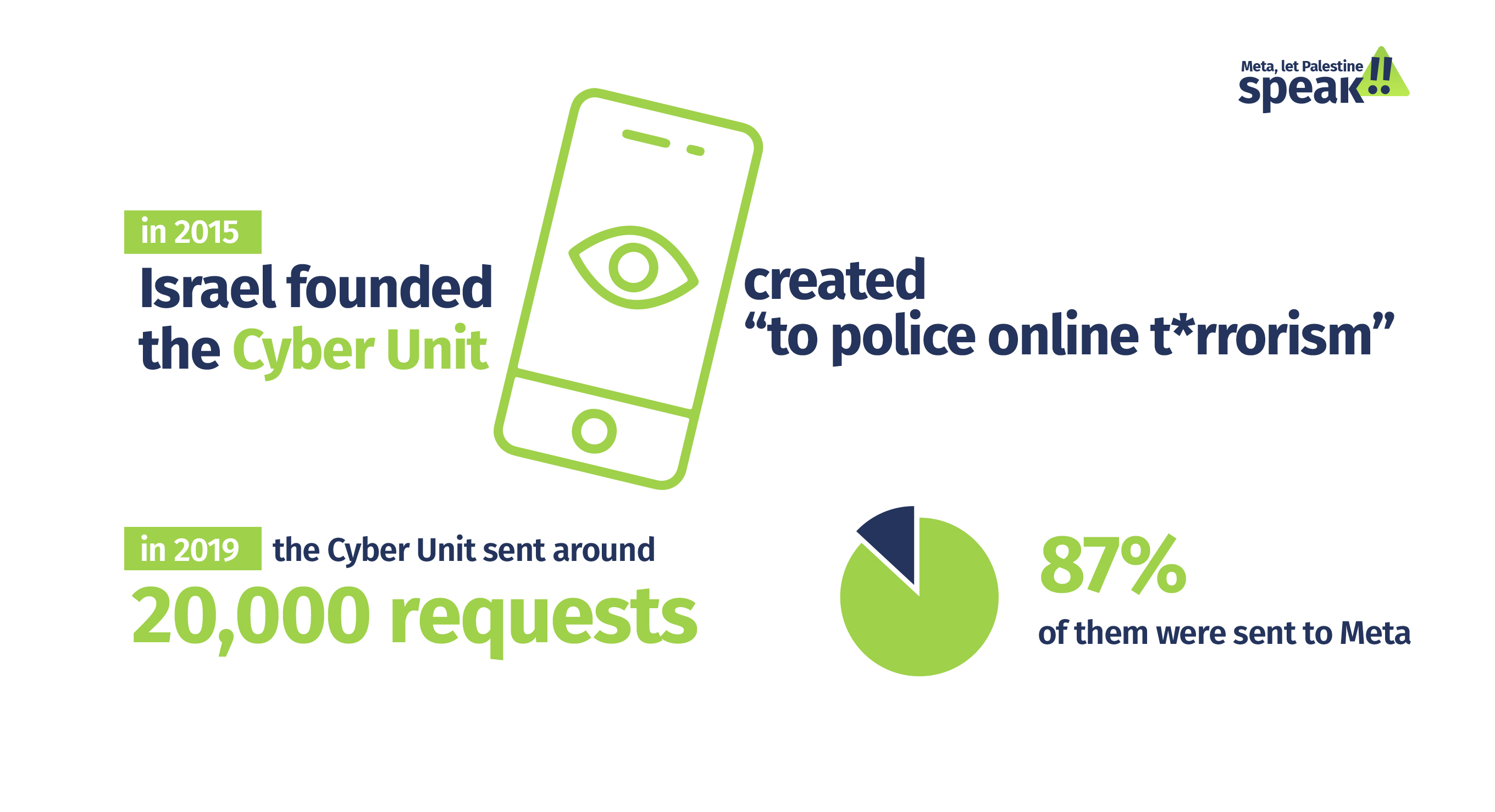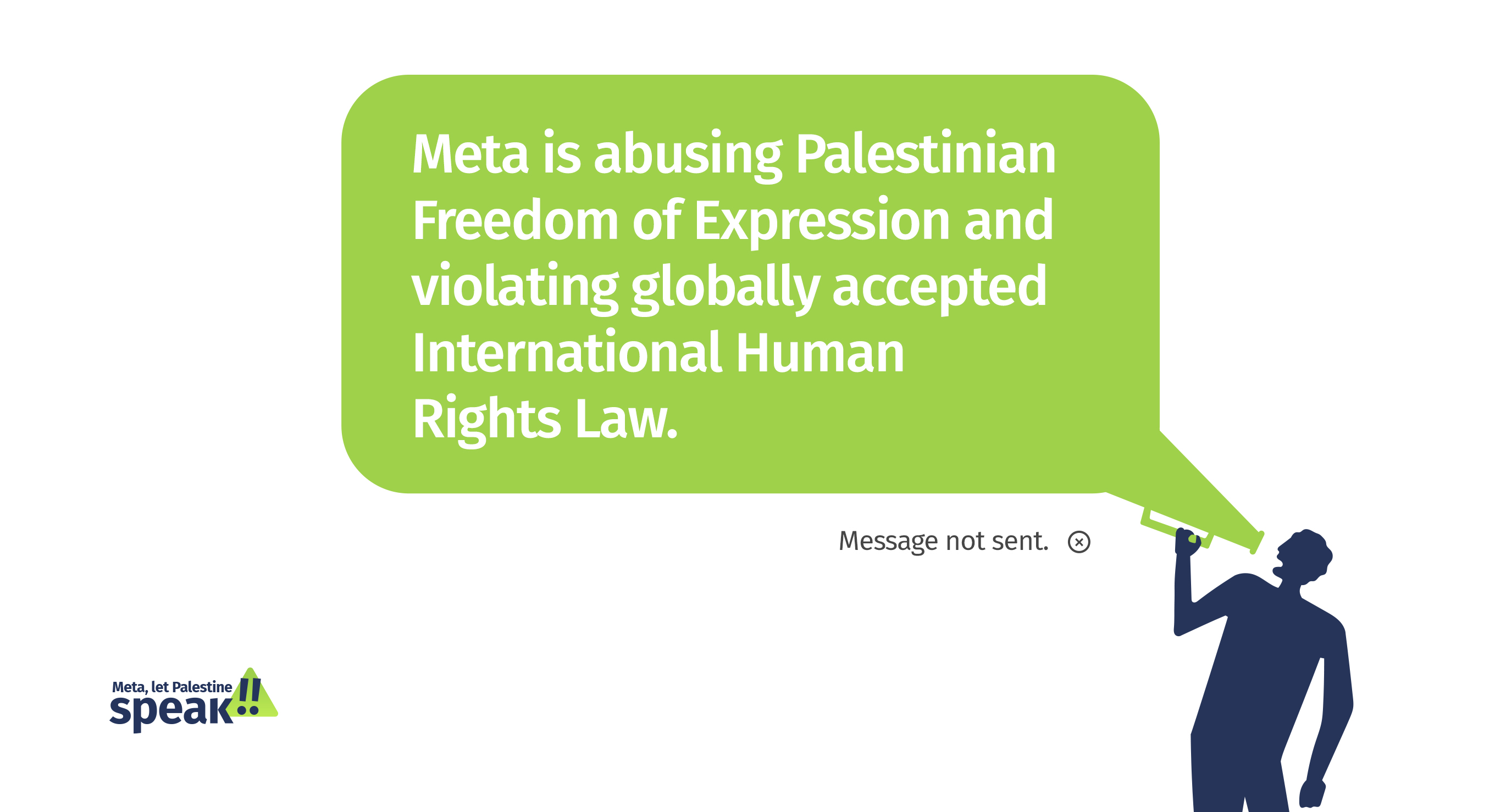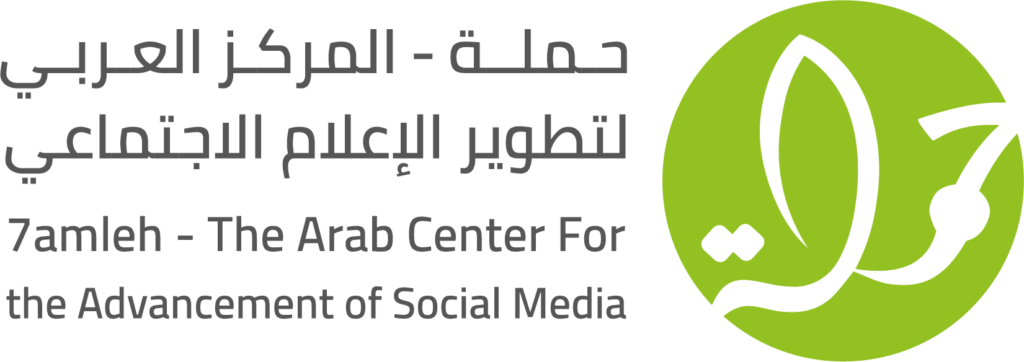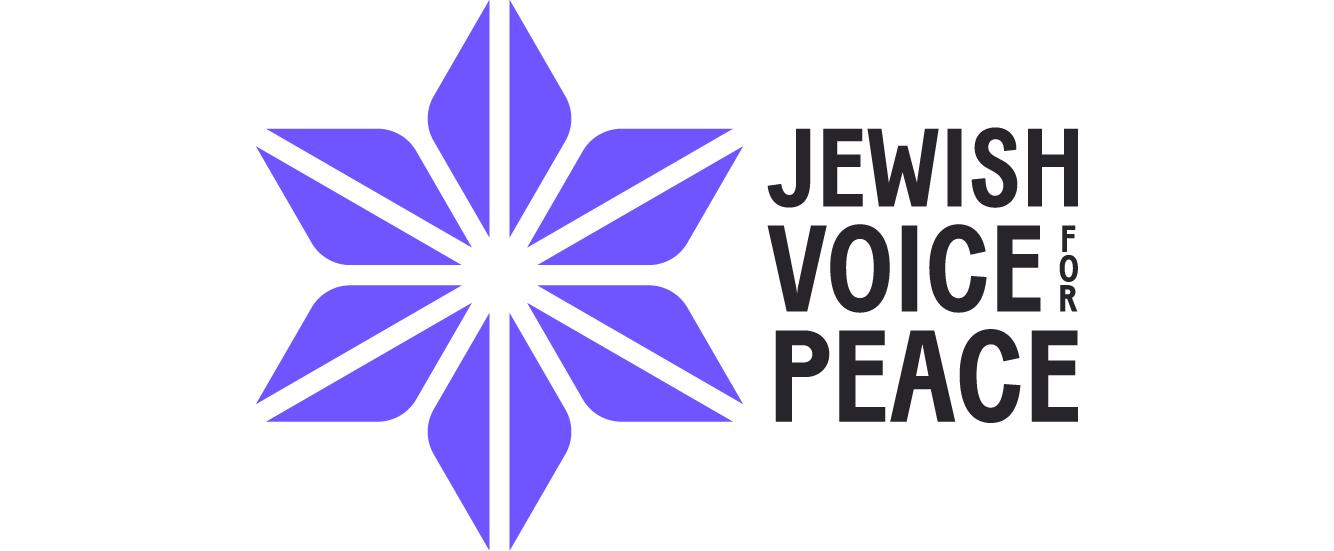

Meta is extremely important to Palestinian digital rights because as the largest social media company in the world, its policies are actively shaping the digital space where digital rights are either respected or violated. As such, it is Meta’s responsibility to ensure that their platforms are an inclusive, equal, and nondiscriminatory space for everyone, and that they are developing systems that not only respect, but also proactively protect digital rights. Meta knows this, as they have committed to as much in their Corporate Human Rights Policy. This is even more important for Palestinians, as the international media coverage of the region often paints a biased picture of the situation, and does not provide accurate accounts of the oppression and human rights violations Palestinians experience on a daily basis. Without the international press, Palestinians' only tool to document human rights violations, and share their story with the world is social media.
Digital rights refers to the expansion of broadly held understandings of human rights, enshrined in international human rights conventions, in the digital world. In fact, the United Nations Human Rights Council adopted a resolution stating “the same rights that people have offline must also be protected online”. When referring to digital rights, there are four primary areas to consider:
The platform has admitted that content moderation is one of their most difficult areas of work. However, Palestinian content experiences what we refer to as “double over moderation”. First, Arabic language content, which is the third most common language on the platform, is overly scrutinized. Second, the state of Israel wields a considerable amount of influence over Meta, and uses it to silence and censor Palestinian content through takedown requests, which Meta complies with 90% of the time, among other tactics.Many of these takedown requests come from Israel’s Cyber Unit, which operates as a de facto censor of Palestinian content for social media companies. Between the over moderation of Arabic content, and the barrage of take down requests issued by the Israeli government, “double over moderation” is applied to Palestinian content, and therefore leads to the silencing and censoring of Palestinian voices.

The Israeli Cyber Unit was founded by the state of Israel in 2015 with the stated goal of “combating online crime and terrorism”. However, in practice, it has been used as a tool by Israel to send tens of thousands of requests to social media companies to take down Palestinian content every year. Furthermore, social media companies overwhelmingly comply with these requests, and social media are becoming increasingly more compliant as time goes on. In 2016, platforms complied with 70% of the Cyber Unit’s requests, and by 2019, that number jumped to 90%, with Meta receiving 87% of the total requests issued by the unit.
Meta has shown a lack of appropriate investment in understanding how to moderate Arabic content, even though it is the third most common language on its platforms. For a long time, Meta outsourced most of its human-based, Arabic content moderation work to Morocco. However, Arabic has close to 30 dialects that are complex and distinct from one another. By hiring almost solely Arabic speakers from North Africa, it created a situation where most Arabic content from outside of North Africa was wrongly judged simply because the content moderators do not have the dialectical expertise to be able to fully understand the content. The tech company was cited to have incorrectly taken down content flagged as violent 77% of the time. Furthermore, as Meta shifts more content moderation to automation, the problem is only exacerbated. Automotive tools need a set of accurately moderated content to learn from, but when the automated tools are based on wrong human decisions, the automotive tools simply recreate a broken system. Therefore, Meta needs to ensure that all moderators checking Palestinian content understand the Shami (Levant) dialect, and only rely on automation that is proven to work across all common dialects.
Shadow banning is the process of limiting the reach of users' content without making the user aware. Perhaps one of the most well known cases of this is Mohammed El-Kurd’s instagram stories during the May Uprisings of 2021. El-Kurd, a prominent Palestinian writer and activist, was regularly receiving over 150k views on his stories. However, when he started posting about the eviction process his family was being subjected to in the East Jerusalem neighborhood of Sheikh Jarrah , his story’s views dropped to around 150k.Many Palestinians have reported experiencing something similar happening to their accounts whenever they post about Palestine. In this way, shadow banning silences Palestinians trying to share their voice, perspective, and life. The anonymous nature of the action, social media platforms do not tell users they are being shadow-banned, gas lights Palestinians who feel like they are being initially censored and silenced.
The recent Russian invasion of Ukraine has prompted Meta to make an exception to its hate speech and/or incitement of violence policies. Meta officials have stated that posts such as “death to Russian invaders”, and or calls for death to the Russian or Belarusian Presidents will be permitted on their platforms. This stands in a jarring juxtaposition to how Palestinians, as a community living under constant occupation for many decades, are treated on the platform.
While Ukrainians are allowed to call for the death of soldiers and their leaders, Palestinian content is shadow banned, and accounts are often disabled, for simply documenting human rights violations, such as, livestreaming Israel occupying forces illegally evicting Palestinians from their homes. The discriminatory treatment of Palestinians is even further cemented by the incitement of violence and hate speech against Palestinians that is proliferated on Meta’s platforms in Hebrew.

Yes, most notably, Meta is impending on Palestinians freedom of expression.
This is one of the most widely recognized human and digital rights, and is enshrined in the
International Covenant on Civil and Political Rights
(ICCPR). The ICCPR is one of the most important international human rights documents, and in Article 19, it states:
“Everyone shall have the right to freedom of expression; this right shall include freedom to seek, receive and impart
information and ideas of all kinds, regardless of frontiers, either orally, in writing or in print, in the form of art, or
through any other media of his choice.”
Furthermore, the
United Nations Guiding Principles on Business and Human Rights
states
“Business enterprises should respect human rights. This means that they should
avoid infringing on the human rights of others and should address adverse
human rights impacts with which they are involved.”
The Guiding Principles then go further to state:
“The responsibility of business enterprises to respect human rights refers to
internationally recognized human rights”.
With this international legal doctrine, and the widespread proof of systematic censoring and silencing of Palestinian voices and narratives on Meta’s platforms, it is clear that Meta is violating international law.
Moreover, Meta has sold advertisements for land developments in the illegal settlements across the occupied West Bank and East Jerusalem. These settlements are illegal due to the Fourth Geneva Convention, which states:
“shall not deport or transfer parts of its own civilian population into the territory it occupies.”
Furthermore, the International Criminal Court considers this type of transfer of land to be a war crime. Therefore, by selling advertisements for land developments in the illegal settlements, Meta is not only supporting an internationally illegal endeavor, it is also profiting from a war crime.
Yes! First, send an email to Meta Executives to #LetPalestineSpeak. Then, let your community know about the issue by posting on your own social media accounts! Check out 7amleh’s account for posts on this topic, and feel free to share!
Finally, if content you post about Palestine is silence or censored, report to 7or, the Observatory of Palestinian Digital Rights Violations, and encourage your friends to do the same! This helps us provide proof of the problem, as well as allows us to help you get your content reinstated.
The “Facebook Bill” is a bill that has been introduced into the Israeli Knesset. Although proponents of the bill state that its purpose is to prevent the incitement of violence on social media, it is clearly an attempt to further restrict freedom of expression online. It is referred to as the “Facebook Bill” because it would grant Israel more authority over content online, and would enable the state to order posts be taken down from the social media platforms. However, the bill is not limited to Facebook, and opponents of the bill say that it would be used as a tool by the state to censor speech it does not want online. By and large, the global digital rights community views this bill as a draconian measure that would harm freedom of expression online. At the time of this posting, the bill has only passed through committee, and still needs to be voted on by the entire Knesset. You can read 7amleh’s full legal analysis of the bill here.





 4.png)




.png)




